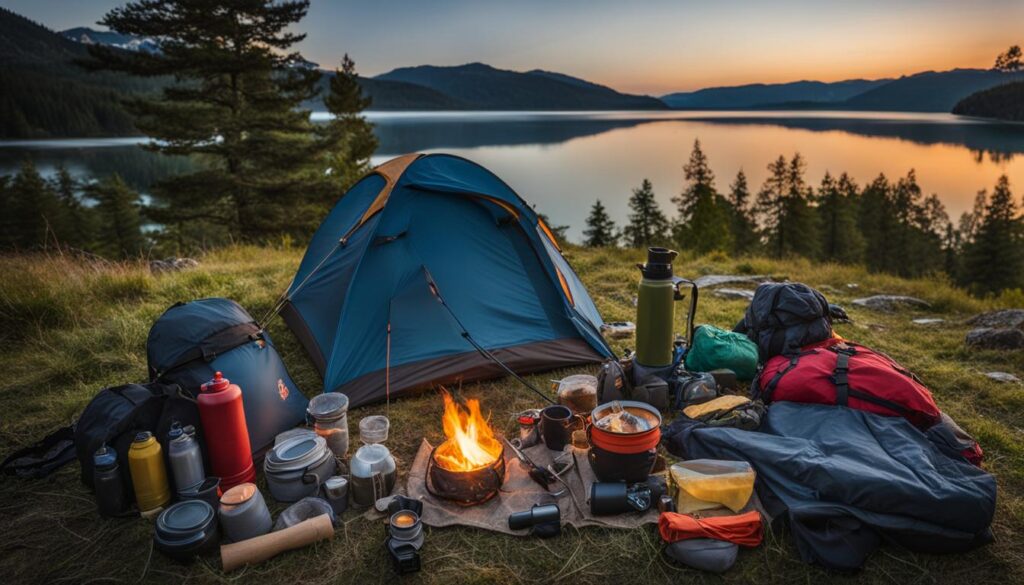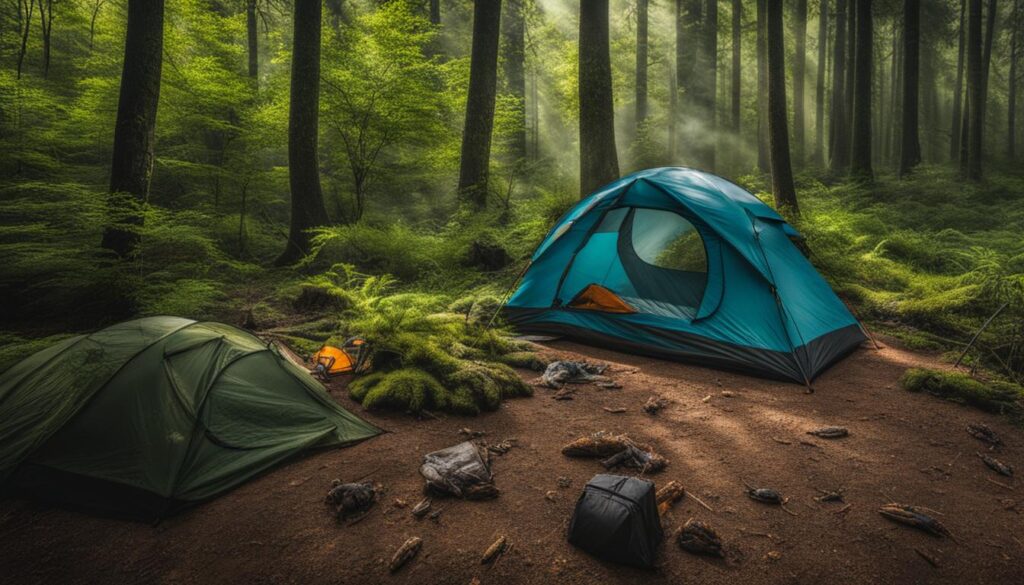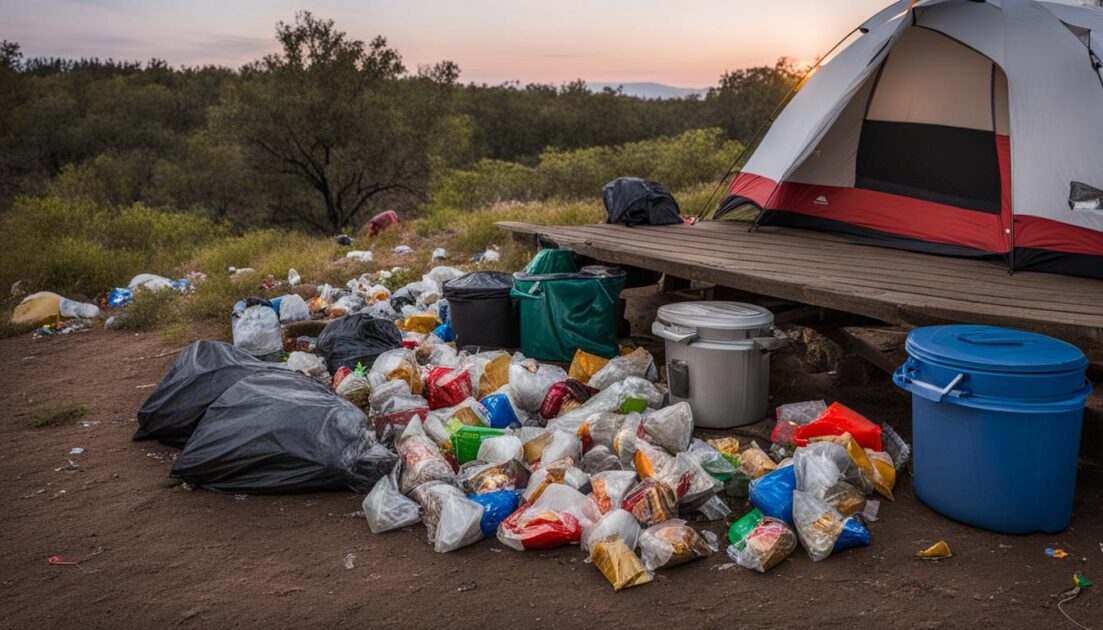When planning a camping trip, it’s crucial to pack smart and only bring the essentials. Overpacking can lead to unnecessary hassle and added weight, which can detract from the overall experience. To help you pack wisely, I’ve compiled a list of items that you should avoid bringing on your camping adventure. These recommendations are based on advice from experts and seasoned campers who understand the importance of traveling light and embracing the great outdoors.
Key Takeaways:
- Leaving electronic devices at home ensures a distraction-free camping experience.
- Avoid bringing glass items to minimize hazards and potential accidents.
- Opt for reusable water bottles to reduce plastic waste and stay hydrated.
- Stay fragrance-free to embrace the natural camping environment and avoid attracting pests.
- Avoid using wet wipes to prioritize the environment and show respect for campground waste management.
Electronics
When it comes to camping, disconnecting from the digital world and immersing yourself in nature is part of the appeal. That’s why it’s best to leave your electronic devices at home and fully embrace the outdoor experience. By avoiding camping with electronics such as video games, laptops, expensive gadgets, and music players, you can truly connect with your surroundings and appreciate the beauty of nature without any distractions.
Leaving behind your camping gear and camping electronics can offer a range of benefits. Firstly, it eliminates the risk of potential damage to your devices. Camping involves a variety of activities that could expose your electronics to water, dirt, or accidental drops. By keeping them at home, you can rest assured knowing that they are safe and secure.
Furthermore, disconnecting from electronics allows you to fully engage with your camping companions and the environment around you. Instead of staring at screens, you can spend quality time together, enjoying campfire conversations, exploring the wilderness, and participating in outdoor activities.
“The joy of camping lies in disconnecting from the virtual world and reconnecting with nature. Leave your electronic devices at home and savor the authentic camping experience.”
While it might be tempting to bring electronics for convenience or entertainment, doing so detracts from the purpose of camping—to appreciate the natural surroundings and recharge your mind and body. By simplifying your camping experience, you can fully immerse yourself in the tranquility of the outdoors.
To enhance your camping experience, consider replacing electronics with alternative activities and items that bring you closer to nature. Bring along camping essentials such as tents, sleeping bags, cooking gear, and hiking equipment. These items will support your adventure and allow you to make the most of your time in the great outdoors.
Camping Essentials Checklist:
| Camping Gear | Description |
|---|---|
| Tent | A waterproof shelter for camping |
| Sleeping Bag | A warm and comfortable sleeping bag for a good night’s rest |
| Cooking Stove | A portable stove for preparing meals |
| Hiking Boots | Durable and supportive boots for trekking and hiking |
| Headlamp | A hands-free light source for nighttime activities |
By focusing on camping essentials and leaving electronics behind, you can fully appreciate the raw beauty of nature and create unforgettable memories with your fellow campers. Embrace the simplicity of camping and immerse yourself in the great outdoors.

Glass Items
When preparing for a camping trip, it’s important to consider the safety of yourself and fellow campers. One potential hazard to avoid is bringing glass items. Glass containers are prone to breakage during transport or use, posing a significant risk. Not only can broken shards cause injuries, but they can also be left behind on the ground, posing a danger to unsuspecting campers.
To ensure a safe camping experience for everyone, it’s better to opt for alternative packaging options that are sustainable and non-breakable. There are numerous eco-friendly alternatives available that can not only minimize waste but also eliminate the risk of accidents associated with glass containers.
Consider using the following packed in your camping gear:
| Sustainable Camping Packaging Alternatives |
|---|
| 1. Stainless steel containers |
| 2. BPA-free plastic containers |
| 3. Silicone storage bags |
| 4. Collapsible food containers |
| 5. Mason jars |
By using these alternatives, you can eliminate the potential hazards associated with glass items and contribute to a safer camping environment.
Benefits of Non-Glass Packaging Options
“Using sustainable camping packaging alternatives not only ensures the safety of campers but also reduces the risk of littering and minimizes the impact on the environment. Investing in non-breakable containers and bags is an investment in sustainable camping practices.”
– Camping Expert

Single Use Plastic Bottles
When it comes to camping, it’s crucial to make sustainable choices to minimize waste and protect the environment. One simple change you can make is to switch from single-use plastic bottles to reusable water bottles. By doing so, you not only reduce plastic pollution but also ensure proper hydration during your camping trip.
Plastic pollution is a significant issue, with billions of single-use plastic bottles ending up in landfills or polluting our oceans each year. As campers, we have the power to reduce this waste by opting for reusable water bottles. Not only are they more eco-friendly, but they also help save money in the long run.
Reusable water bottles are designed to withstand rugged outdoor conditions, making them perfect for camping adventures. You can choose from a variety of durable materials like stainless steel or BPA-free plastic. These bottles are lightweight, easy to clean, and can withstand accidental drops during hikes or other outdoor activities.
Benefits of Using Reusable Water Bottles:
- Reduces plastic waste
- Cost-effective
- Durable and long-lasting
- Lightweight and portable
- Easy to refill from potable water resources
When camping, most campgrounds provide access to potable water sources where you can refill your reusable water bottle. This eliminates the need for single-use plastic bottles and ensures you stay properly hydrated throughout your trip.
Additionally, using a reusable water bottle allows you to personalize it with stickers or markings, turning it into a memorable keepsake of your camping experiences. Not only does it help reduce waste, but it also adds a touch of personality to your gear.
Switching to reusable water bottles is a small change that has a significant impact on reducing plastic waste. By making this choice, we can all contribute to a cleaner and healthier environment for future generations.
So, before you head out on your next camping trip, make sure to pack your reusable water bottle and stay hydrated while also protecting our planet.
Body Sprays and Fragrances
When it comes to camping hygiene, it’s important to consider the potential hazards and inconveniences that certain products can bring to your outdoor experience. Body sprays and fragrances may seem like essential items for personal care, but they can actually pose several problems while camping.
Firstly, using body sprays and fragrances can contaminate the fresh air around you. The strong scents can linger and affect not only your own campsite but also the surrounding areas where other campers are trying to enjoy the natural ambiance. By avoiding these products, you contribute to maintaining a clean and pleasant atmosphere for everyone.
Moreover, body sprays and fragrances can attract unwanted animals and bugs, which can be particularly problematic while camping. Mosquitoes, bees, and other insects are naturally drawn to floral and fruity scents. By using fragrances, you inadvertently become a target for these pesky visitors who can disrupt your peace and comfort during your outdoor adventure.
Instead of relying on body sprays and fragrances, it’s wise to opt for minimalistic hygiene essentials like deodorant. Deodorants are designed to provide long-lasting odor protection without overwhelming scents. Additionally, taking advantage of the hot showers available at campgrounds ensures that you can maintain personal hygiene effectively without the need for strong fragrances.
Embracing the Natural Environment
“Camping is all about immersing yourself in nature and experiencing the beauty of the great outdoors. By avoiding body sprays and fragrances, you can truly embrace the authentic camping experience and appreciate the sights, sounds, and scents that nature has to offer.” – Sarah Wilson, Experienced Camper
By prioritizing camping hygiene without relying on body sprays and fragrances, you not only minimize potential hazards and inconveniences but also allow yourself to fully connect with the natural environment. After all, being in the wild means embracing the earthy aromas of the forest, the crisp scent of fresh air, and the subtle fragrance of campfires.
Illustrating the importance of avoiding body sprays and fragrances while camping, here is a visual representation:
| Issues | Consequences |
|---|---|
| Contamination of fresh air | Disrupts the natural ambiance and affects other campers |
| Attracting unwanted animals and bugs | Increases the risk of bites, stings, and overall discomfort |
| Loss of authentic camping experience | Diminishes the opportunity to fully embrace the natural environment |
Remember, camping is a chance to disconnect from the hustle and bustle of daily life and reconnect with nature. So, leave the body sprays and fragrances behind, and revel in the true essence of camping.

Wet Wipes
When it comes to camping hygiene, wet wipes may seem like a convenient option. However, it’s important to consider the environmental impact of using wet wipes and their effects on campground waste management.
Despite some wet wipes claiming to be flushable, they can cause serious damage to sewer systems and contribute to clogged pipes and pollution. Campgrounds value campers who prioritize the environment and their facilities by using alternative hygiene solutions that are more sustainable.
Instead of relying on wet wipes, consider using water and soap for cleaning purposes while camping. This not only reduces the environmental impact but also helps to maintain the cleanliness and integrity of campground waste management systems.
By making small changes to our camping habits, such as avoiding wet wipes, we can contribute to the overall sustainability of campgrounds and protect the environment for future generations of campers to enjoy.
FAQ
What electronic devices should I avoid bringing when camping?
It’s best to leave video games, laptops, expensive electronics, and music players at home when camping. This allows you to fully immerse yourself in nature and enjoy the outdoor experience without distractions.
Why should I avoid bringing glass items while camping?
Glass can easily break during transport or use, posing a hazard to yourself and other campers. Opt for sustainable and non-breakable packaging options to minimize waste and potential accidents.
Should I bring single-use plastic bottles on my camping trip?
It’s recommended to pack a reusable water bottle instead of single-use plastic bottles. This helps protect the environment by minimizing plastic pollution and allows you to easily refill your bottle from potable water resources available at campgrounds.
Can I use body sprays and fragrances while camping?
It’s best to avoid using body sprays and fragrances while camping. These products contaminate the fresh air, attract unwanted animals and bugs, and take away from the authentic camping experience.
Are wet wipes a good choice for camping hygiene?
Wet wipes can have a significant negative impact on campground waste management and sewer systems. It’s best to avoid using them altogether, even if they claim to be flushable. Opt for alternative hygiene solutions or simply use water and soap for cleaning purposes while camping.

